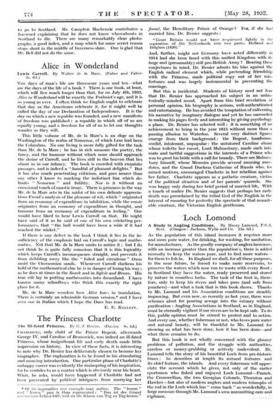The Princess Charlotte
The Ill-fated Princess. By G. J. Bonier. (Davies. Ss. Gd.)
.11A111.017E, only child of the Prince Regent, afterwards George IV, and Caroline of Brunswick, was indeed an ill-fated Princess, whose insignificant life and early death made little impression on history. In view of these facts, it is interesting to note why Dr. Renier has deliberately chosen to become her biographer. The explanation is to be found in his stimulating and amusing introduction. One particular phase of Charlotte's unhappy career was evidently the mainspring of his inspiration, for he confides to us a matter which is obviously near his heart. What, he asks, would have happened if Charlotte had not been prevented by political intriguers from ,marrying her * Of its ingenuitics one example may suffice. The " lesson " and " lessen " pun is thus represented : " Das ist dor Gnmd ,a arum man T.chrer halt, wail sic die Klass° von Tag en Tag leeren."
fiancé, the Hereditary Prince of- Orange.? For, if sbe had married him, Dr. Renier suggests : "Groat Britain would not have acquiesced lightly in the separation of the Netherlands into two parts: Holland and Belgium (1830)."
And, further, might not Germany have acted differently in 1914 had she been faced with this unified Kingdom with its large and (presumably) still pro-British Army ? Bearing these conjectures in mind, Dr. Renier admits his bias against the English radical element which, while pretending friendship with the Princess, made political copy out of her mis- fortunes and was largely instrumental in preventing the marriage.
But this is incidental. Students of history need not fear that Dr. Renier has approached his subject in an unhis- torically-minded mood. Apart from this brief revelation of personal opinion, his biography is serious, well-authenticated and entertaining. He Ina avoided the temptation of enlivening his narrative by imaginary dialogue and yet he has succeeded in making his pages lively and interesting by giving psychology a place. Dr. Renier has selected well : it is something of an achievement to bring in the year 1815 without more than a passing allusion to Waterloo. Several very distinct figure,- emerge from their background : the Regent, handsome, sordid, intolerant, unpopular : the untutored Caroline about whose toilette her escort, Lord Mahnesbury, made such inti- mate and tactful suggestions in the interests of a Prince who was to greet his bride with a call for brandy. There are Malmes- bury himself, whose Memoirs provide several amusing anec- dotes, and the Grand Duchess Catherine of Russia who, for mixed motives, encouraged Charlotte in her rebellion against her father. Charlotte appears as a pathetic creature, victim of the political situation and of her parents' quarrels. She was happy only during her brief period of married life, With a touch of malice Dr. Renier suggests that perhaps her early death was preordained by the tribal God of the English in the interest of ensuring for posterity the spectacle of that remark- able creature, the Victorian English gentleman.








































 Previous page
Previous page